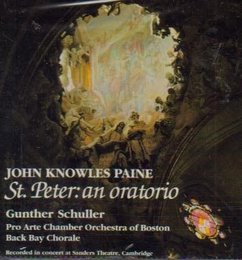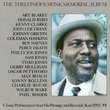| All Artists: Paine, Ommerle, Fortunato, Kelly, Schuller Title: St. Peter (An Oratorio) Members Wishing: 0 Total Copies: 0 Label: G.M. Recordings Release Date: 9/25/1996 Genre: Classical Styles: Opera & Classical Vocal, Historical Periods, Classical (c.1770-1830) Number of Discs: 2 SwapaCD Credits: 2 UPC: 781007202726 |
Search - Paine, Ommerle, Fortunato :: St. Peter (An Oratorio)
 | Paine, Ommerle, Fortunato St. Peter (An Oratorio) Genre: Classical
|
Larger Image |
CD DetailsSimilar CDs
|
CD ReviewsNew England Romanticism 01/26/2000 (4 out of 5 stars) "This piece was premiered in Boston in 1873--the work of a young man from Portland MA who had studied composition in Germany in the early 1860's and took up the first professorship of music in the country--at Harvard University. It apparently received good reviews by Boston music critics, but soon faded into obscurity. This titanic oratorio is an attempt by an American composer to combine the style of Schumann and Mendelssohn with the sentiments of Victorian Boston, and overall, this effort works very well. Paine is best at expressiving tender sentiments--the aria "The spirit of the Lord is upon me" is a fine example of his use of broad, warm melody. The slow choruses follow this same pattern too. In his grand, fully orchestrated and fast choruses such as the opening and closing numbers, the grandeur that Paine reaches can be almost overwhelming and dizzying--at times almost too much. Yet he handles complicated polyphonic choral writing very well. His broad, grand melodies also sound very "Fair Harvard" (the piece incidenty was recorded in Harvard's Sanders Theater). A fine job by the musicians and Gunther Schuller in particular in bringing this piece alive and vibrant--a less-polished performance could have very easily made the work seem very clunky and ponderous." Major Americana Bill Parker | Saint Paul, MN United States | 12/08/2005 (4 out of 5 stars) "This recording is a major addition to a repertoire we Americans should be ashamed to have neglected so brutally: our own. Yes, we pay homage to Copland and Bernstein and a couple of others, and quite rightly. But there are many dozens of additional American composers who receive short shrift from audiences and recording companies, with no reason I can discern other than assumptions that (1) they must be inferior to "real" [European] composers, and (2) nobody would be interested in hearing them. I am at a loss as to how anyone who has really dipped in to the music of Cowell or Creston, Chadwick or Piston, MacDowell or Deems Taylor, Quincy Porter or John Alden Carpenter, could entertain such notions. Obviously, they haven't heard their music. They have only read their names in books, and repeated the tired canard that a whole generation of Americans were mere drooling slaveys to German and Austrian Romantic models, and that only iconoclasts like Charles Ives deserve any attention today.
Such a condescending viewpoint is almost beneath contempt and smacks of the most outrageous hypocrisy, especially since, as Gunther Schuller points out, "it is insidious double-talk for us Americans to cherish the German-Austrian musical tradition in our own performing organizations....and then turn around and chastise our first composers-pioneers in a cultural wasteland-for regarding such Central European masters as their musical and philosophical mentors." Mr. Schuller, himself a major composer, teacher, and conductor, is the mentor of this first recording of an oratorio by "our first great American composer," John Knowles Paine, whose Christian names I felt constrained to give in the header to have any hope of stimulating recognition (one may always forego "Wolfgang Amadeus," "Ludwig van," and the like). Mr. Schuller came across this long-forgotten work about 30 years ago and ever since has nurtured a dream to revive it, which he does herewith. (It had been first given in Portland, Maine in 1873, and apparently only once afterwards, a year later in Boston.) St. Peter is frankly modeled on the Bach Passions and on Mendelssohn's Elijah, and partakes of the musical syntax of the German Romantics; it even quotes standard hymns of Paine's day, including the still-used "Praise to the Father," and makes some forthright obeisances to both Bach and Handel, the latter quite literally in the soprano air "O man of God, be strong." Despite its clear antecedents, this music speaks with its own voice too, and suggests not plagiarism but a thoroughly American knack for building on the heritage of the past. There are many beauties here: try the stirring brass at "And on the third day he rose again." The performance is fully professional and surely as authoritative as we are ever likely to get. The four soloists are excellent, especially mezzo D'Anna Fortunato who should be known far more than she is. The baritone's diction is very much on the Victorian side, but maybe that's appropriate for the work at hand. Wonderfully quiet for a live recording, except for one lusty sneeze during score no. 18. Recommended to lovers of the choral/sacred category, and more especially to enthusiastic connoisseurs of worthwhile American concert music. " |

 Track Listings (19) - Disc #1
Track Listings (19) - Disc #1
